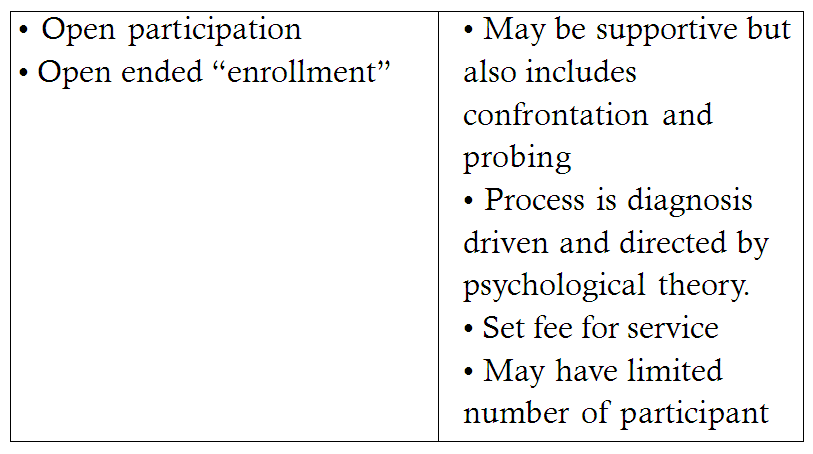|
“We cannot climb up a rope that is attached only to our own belt.” William Ernest Hocking Support groups are the organizations of people who share a common disorder and problems who meet together to discuss their experiences, share ideas, and provide emotional support for one another. Usually a support group is led by a member who has had some training in facilitating group discussions. Unlike formal group therapy, self-help support groups are usually not led by a professional therapist but nevertheless can be a helpful coping tool to complement formal treatment. For some types of problems, such as bereavement after the death of a loved one, or coping with chronic medical conditions like cancer, chronic kidney disease, HIV, hospitals or community agencies often provide support groups led by a social worker or other counselor. History :
What to Expect in a Support Group Support groups vary, it is a group of people meet on a regular basis to discuss their experiences and provide mutual support. Unlike formal group therapy, the meeting is often led by a lay person or group member with some training in facilitating group discussions. The group leader may act as a moderator. Support groups can help anyone who is in need of emotional support for a particular problem especially for people who may feel isolated or feel that other people in their lives don’t fully understand the kinds of problems they may be struggling with. A support group is made up of people who have a similar condition or problem. But in some cases, the group consists of people who have different specific disorders (like a variety of mental health or medical conditions) but share a common goal of seeking emotional support. Chronic Disease:
Psycho-social aspects of chronically ill patients:
Psycho-social aspects of Parents/Caregivers of chronically ill patients
Psycho-social problems in siblings of chronically ill children
Their Common Psychological Reaction has to be addressed in the time. Support has to be provided to deal with crisis situations. Following are the situations in which patients and family needs the psycho-social support.
Outcome: The outcome of the support group is found in decreased number of dropout rates ,regular follow-up ,increased adjustment ability & long term coping skills, compliance to the medical treatment, decreases behavioral disturbances, psychological well-being and medical care. Improved coping skills and ability of resolve family conflicts; it also helped us to prepare them to face the outcome of the treatment. Regularity and continuation in treatment is also one of the major changes found in our patients. To conclude, the secret of quality is love, we have to love your patients, we have to love your profession and if we have love, we can work backward to monitor and improve the system.” References:
Dr. R Shivappa Associate Professor and Chairman, DOS in Social Work, University of Mysore, Manasagangothri, Mysuru. Rochana D’souza Medico-Social Worker, St.Johns Medical College Hospital, Bengaluru. |
Categories
All
Social Work Learning Academy50,000 HR PROFESSIONALS ARE CONNECTED THROUGH OUR NIRATHANKA HR GROUPS.
YOU CAN ALSO JOIN AND PARTICIPATE IN OUR GROUP DISCUSSIONS. MHR LEARNING ACADEMYGet it on Google Play store
|
SITE MAP
SiteTRAININGJOB |
HR SERVICESOTHER SERVICESnIRATHANKA CITIZENS CONNECT |
NIRATHANKAPOSHOUR OTHER WEBSITESSubscribe |
MHR LEARNING ACADEMY
50,000 HR AND SOCIAL WORK PROFESSIONALS ARE CONNECTED THROUGH OUR NIRATHANKA HR GROUPS.
YOU CAN ALSO JOIN AND PARTICIPATE IN OUR GROUP DISCUSSIONS.
YOU CAN ALSO JOIN AND PARTICIPATE IN OUR GROUP DISCUSSIONS.
|
|










 RSS Feed
RSS Feed





